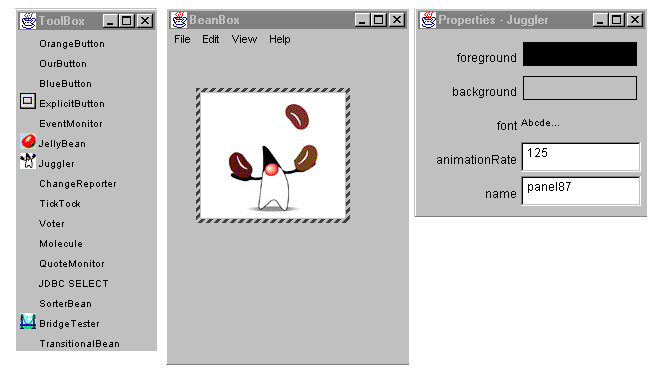
JavaBeans Development Kit (BDK)
JavaBeans Development Kit includes a reference Bean container and a variety of reusable example source code.BDK is designed for use by both JavaBeans component and tool developers.
It comes with: the JavaBeans API sources which are provided as .java reference sources; the BeanBox test container which allows you to test out your new Beans against a reference container, and also acts an example of how to build a Bean container; fifteen example Beans which can run in the BeanBox and demonstrate various Bean behavior; various source code; makefile information; and a tutorial.
JavaBeans Concepts
JavaBeans brings component technology to the Java platform. With the JavaBeans API you can create reuseable, platform-independent components. Using JavaBeans-compliant application builder tools, you can combine these components into applets, applications, or composite components. JavaBean components are known as Beans.JavaBeans is a core JDK1.1 capability. Any JDK1.1-compliant browser or tool implicitly supports JavaBeans.
The BDK is available free from our website, you will need the Java Development Kit (JDK).
The JavaBeans API makes it possible to write component software in the Java programming language. Components are self-contained, reusable software units that can be visually composed into composite components, applets, applications, and servlets using visual application builder tools. JavaBean components are known as Beans. Components expose their features (for example, public methods and events) to builder tools for visual manipulation. A Bean's features are exposed because feature names adhere to specific design patterns. A "JavaBeans-enabled" builder tool can then examine the Bean's patterns, discern its features, and expose those features for visual manipulation. A builder tool maintains Beans in a palette or toolbox. You can select a Bean from the toolbox, drop it into a form, modify it's appearance and behavior, define its interaction with other Beans, and compose it and other Beans into an applet, application, or new Bean. All this can be done without writing a line of code.
The following list briefly describes key Bean concepts, and gives the chapter in the JavaBeans specification where you can read a complete description.
- Builder tools discover a Bean's features (that is, its properties, methods, and events) by a process known as introspection. Beans support introspection in two ways:
By adhering to specific rules, known as design patterns, when naming Bean features. The Introspector (in the API reference documentation) class examines Beans for these design patterns to discover Bean features. The Introspector class relies on the core reflection (outside of the tutorial) API. The trail The Reflection API (in the JavaBeans(TM) trail) is an excellent place to learn about reflection.
By explicitly providing property, method, and event information with a related Bean Information class. A Bean information class implements the BeanInfo interface. A BeanInfo class explicitly lists those Bean features that are to be exposed to application builder tools. Chapter 8 of the JavaBeans API Specification (outside of the tutorial) discusses introspection, design patterns, and BeanInfo objects.
-Properties are a Bean's appearance and behavior characteristics that can be changed at design time. Builder tools introspect on a Bean to discover its properties, and expose those properties for manipulation. Chapter 7 of the JavaBeans API Specification discusses properties.
-Beans expose properties so they can be customized at design time. Customization is supported in two ways: By using property editors, or by using more sophisticated Bean customizers. Chapter 9 of the JavaBeans API Specification discusses Bean customization.
-Beans use events to communicate with other Beans. A Bean that wants to receive events (a listener Bean) registers its interest with the Bean that fires the event (a source Bean). Builder tools can examine a Bean and determine which events that Bean can fire (send) and which it can handle (receive). Chapter 6 of the JavaBeans API Specification discusses events.
Conclusion
To conclude JavaBeans Development Kit (BDK) works on Windows operating system(s) and can be easily downloaded using the below download link according to Freeware license. JavaBeans Development Kit (BDK) download file is only 1.1 MB in size.JavaBeans Development Kit (BDK) was filed under the Java and Javascript category and was reviewed in softlookup.com and receive 5/5 Score.
JavaBeans Development Kit (BDK) has been tested by our team against viruses, spyware, adware, trojan, backdoors and was found to be 100% clean. We will recheck JavaBeans Development Kit (BDK) when updated to assure that it remains clean.
JavaBeans Development Kit (BDK) user Review
Please review JavaBeans Development Kit (BDK) application and submit your comments below. We will collect all comments in an effort to determine whether the JavaBeans Development Kit (BDK) software is reliable, perform as expected and deliver the promised features and functionalities.Popularity 10/10 - Downloads - 8541 - Score - 5/5
Softlookup.com 2023 - Privacy Policy
| Category: | Java and Javascript |
| Publisher: | Sun Microsystems, Inc. |
| Last Updated: | 02/07/2019 |
| Requirements: | Not specified |
| License: | Freeware |
| Operating system: | Windows |
| Hits: | 11930 |
| File size: | 1.1 MB |
| Price: | Not specified |
| Name: * |
E-Mail: * |
| Comment: * |
|